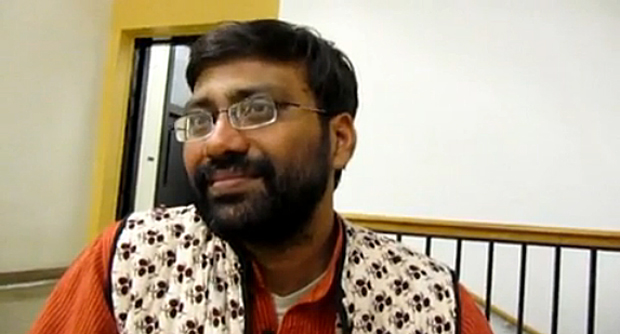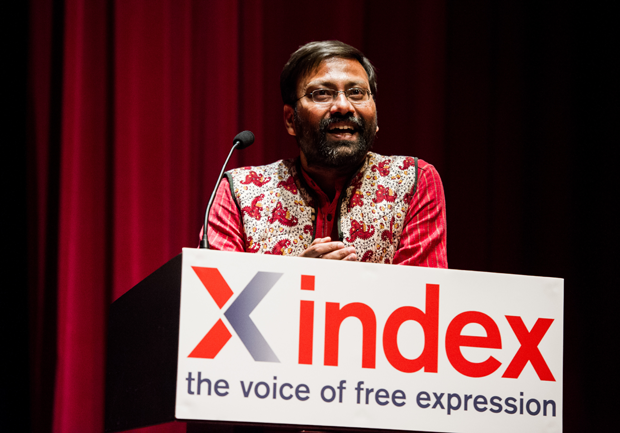Journalist Shubhranshu Choudhary is the brain behind CGNet Swara (Voice of Chhattisgarh) a mobile-phone (no smartphone required) service that allows citizens to upload and listen to local reports in their local language.
Shubhranshu Choudhary acceptance remarks:
Over the last few centuries our politics, world over has got democratized, more or less.
But if you look at mass communication, media or Journalism it still remains aristocratic, top down and more power in the hands of few.
We understand that our political democracy can not mature, function well unless we have a democratic, equitable communication.
But is that possible?
That is the experiment we are trying to do in India.
I grew up in Central India amidst hills and forest with Indigeneous people, whom we also call Adivasis, the tribals.
Central India is in the middle of a bloody war between Maoist guerrillas and Indian security forces. Tribals are led by the Maoists.
My tribal classmates once told me “our smaller problems can be solved if we have a democratic communication platform where each has equal right to speak and being heard.
To create a democratic, more equitable media we are using mobile phone in this experiment. Mobile phones have reached deep interiors even in countries like India.
Everyone has a voice and can speak in their own mother tongue.They feel more comfortable speaking rather then writing as many do not know how to read and write. And even if they know they feel more comfortable as they are an oral community.
Though mobile is owned by many but it is a personal communication tool. We use internet to convert mobile phone into a mass communication tool.
Today the same people who had no voice before are picking up their mobile and are telling their stories in their own languages. The messages, songs get recorded in our computer using an Interactive Voice recorder system and people can hear the same messages on their mobiles once they are cross-checked moderarted by some volunteers.
The same messages are also available online for Urban activists to follow with officials if they are about any problem. We are seeing many problems getting solved by making this simple connectivity.
An accumulation of these unsolved simple problems create bigger problems like the one we are facing in Central India today, which our Prime Minister once called India’s biggest internal security threat.
If problems are not being heard, not being solved, they create the “future terrorists”
But to complete this experiment we need your help.
We need help to connect this experiment to Short wave radio to create a duplicatable and sustainable independent communication model which people can own.
India, though, is world’s biggest democracy, we do not allow Radio. We will need help from outside like yours who can give us space in Radio transmitters.
But it will be a different type of radio, new radio. In this democratic radio programs will not be created in studios or newsrooms but they will be created in far off forests and villages where people through their mobile phone will report. Some of us in the middle on computer/internet will work on improving/editing them.
We Journalists will also be elected by the community and not selected by the powerful few.
This way we will create news which is by the people, of the people and for the people.
If we want a better democracy, a peaceful tomorrow we can not leave Journalism in the hands of few any more. Time has come like politics, Journalism also needs to become everybody’s business.
And it is possible.
— Shubhranshu Choudhary, CGNet Swara
More about Shubhranshu Choudhary
This article was originally posted on 20 March 2014 at indexoncensorship.org







